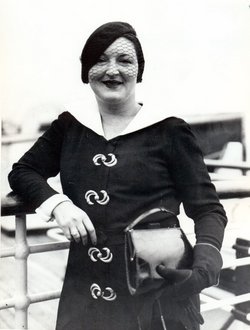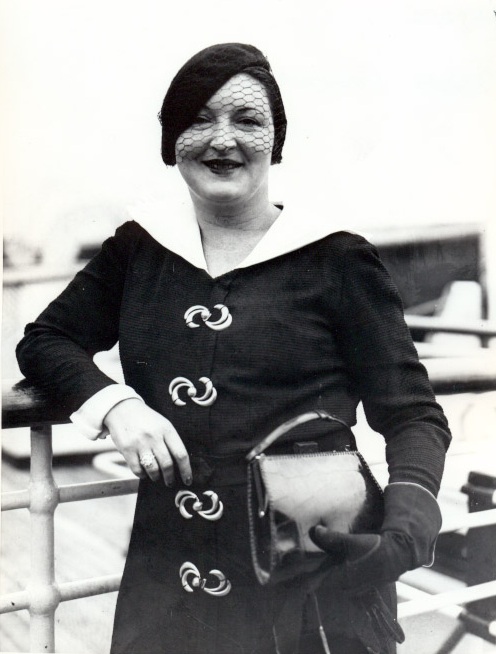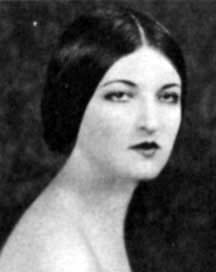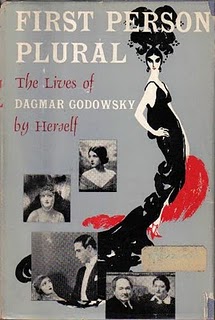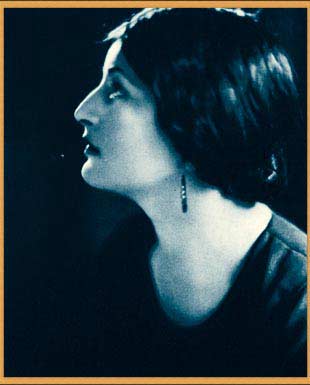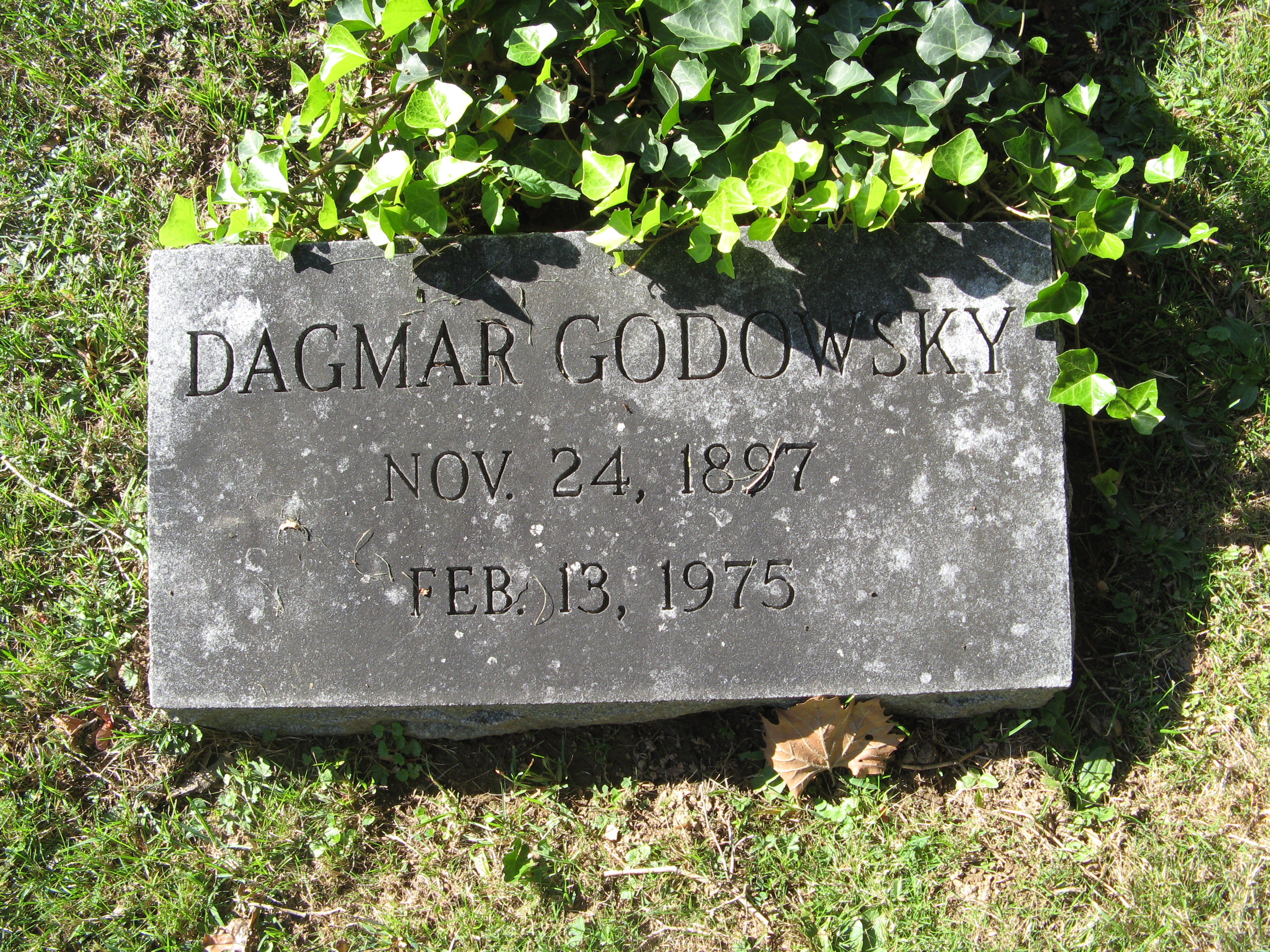In 1921 she wed silent screen actor Frank Mayo in Tijuana, Mexico. She named actress Anna Luther as co-respondent in a suit brought against Mayo in March 1925. The marriage was annulled in August 1928 on the ground that Mayo had another wife.
Dagmar divorced her second husband, James D. Sloan(e), when, immediately after the ceremony, he put his arm around her and asked possessively: "Who do you belong to now?"
In 1958, Viking Press published her autobiography titled "First Person Plural." In the book she named Enrico Caruso, Artur Rubinstein, Jascha Heifetz, Charles Chaplin, Igor Stravinsky, and Valentino among her "great loves." When queried about the number of husbands she had, Godowsky responded, "Two of my own, my dear, and several of my friends."
In her later years she made frequent appearances in London, England and on television talk shows in New York City.
Godowsky died at age 78 in Lenox Hill Hospital in Manhattan on 13 February 1975, the anniversary of her father's birth. Her funeral was held at Riverside Chapel on Amsterdam Avenue and 76th Street.
Time Magazine, 24 Feb 1958
FIRST PERSON PLURAL (249 pp.)—Dagmar Godowsky—Viking ($3.95).
A seedy-looking firing squad aimed its rifles at Dagmar Godowsky. Her father, Pianist Leopold Godowsky, turned to Marie Dressier and said: "Tell me the truth. Marie, do you think Dagmar has a future in pictures?" Replied Veteran Comedienne Dressier: "Definitely." The guns went off and Dagmar, playing Mata Hari. fell to the ground. As she recalls the moment: "My fate was sealed. It was the movies for me."
In First Person Plural Dagmar, now 58, presents a jaunty flashback to the splendiferous silent days "when money was thrown to the winds [but] always landed right back in the box office." Publicity departments "[made] us all creatures of fantasy" so that Theda Bara tried to live up to her studio's statement that "her coming was prophesied on the Nile in the ancient days when Egyptians lived there." Margaret Livingston served a formal tea to her cat every day at 4 ("Ask Paul Whiteman. who later married her"), while Nazimova was the only member of the "nobility of Bedlam" to have "a moon parlor and a lunarium." As for Dagmar herself, she was "The Snake Woman" of Hollywood. "I hissed my way through a hundred interviews, [and my] eyes were supposedly so wicked that men lost their souls if they looked directly into them."
Every Mann. Most of Dagmar's co-vamps had risen straight from "rags to bitches." but Dagmar herself had lived glamorously since the day she was born—not in the wolf-ravaged wastes of Siberia, as her studio insisted, but in Chicago, where her father was teaching. Later, Russian-born Leopold Godowsky--one of the world's top pianists as well as a talented composer--became imperial royal professor of music to Austria's Emperor Franz Joseph. Recalls Dagmar: "It was not unusual to come home [from school] and find Paderewski. Chaliapin, Kreisler, Hofmann, Caruso, Elman, Damrosch" or such writers as "Jakob Wassermann, Gerhart Hauptmann. Hermann Sudermann. Thomas Mann, every mann."
In her teens. Dagmar taught Nijinsky to foxtrot. In her 20s. after she reached Hollywood, she married Western Star Frank Mayo. In her 30s, after a second marriage that lasted only half an hour, by her account, she fell in love with Igor Stravinsky and some dozens of other men. "How did I do it?" she wonders. "All those men in so little time? They're just shadows now. They were even then."
False Notes, False Teeth. The best of Dagmar's book consists of unshadowed portraits from her crowded memoirs:
CHARLIE CHAPLIN "played the violin left-handed." He was "moody" and in his "black periods" would tell Dagmar of the poverty of his London childhood. He had loved "the little girl who lived next door [and] vowed that some day when he conquered the world, he would return and marry her...When he was well established, he returned to Whitechapel to claim his little bride. Just as he started to climb to her little room, a tiny white casket was carried down the stairs...She had died of starvation while waiting for him." Charlie "would cry while telling this story..."
VICENTE BLASCO IBÁÑEZ. terrible-tempered, anticlerical novelist, was looking for a female lead for the movie of his novel. Blood and Sand, when at a party he met pious, vixen-toothed Actress Nita ("Nixie") Naldi, who screamed forthwith: "You Bolshevik! You heathen!...You worm! You Pagan! You anti-Christ!" Ibanez shrilled back so excitedly that his -'upper plate fell out of his mouth into Nixie's bosom." Whereupon the hostess, "who had hoped for a stimulating evening, but not this stimulating, quickly reached down into Nixie, pulled out the teeth, rinsed them in the punch bowl, and pushed them back into [Ibánez'] mouth." Nixie got the part.
IGOR STRAVINSKY was such a firebird that he loved going to the zoo "to watch the wild animals at feeding time, when they devoured the raw meat." But in mien and in amour he was "so disciplined, so logical, so conservative." Dagmar's heart leaped when, at long last, Igor bent forward and murmured: "Come tomorrow night"—then added: "I so want you to meet my wife." Igor and Dagmar "would sit for hours sipping Dubonnet while he unburdened himself" and inveighed against his critics. "Why do they blame me for my music?" he would rage. "Why don't they blame God? He gave me my gifts!" His mother refused to attend the famed Paris première of the Sacre du Printemps because, she said, "I don't think it's my kind of music."
In 1921 she wed silent screen actor Frank Mayo in Tijuana, Mexico. She named actress Anna Luther as co-respondent in a suit brought against Mayo in March 1925. The marriage was annulled in August 1928 on the ground that Mayo had another wife.
Dagmar divorced her second husband, James D. Sloan(e), when, immediately after the ceremony, he put his arm around her and asked possessively: "Who do you belong to now?"
In 1958, Viking Press published her autobiography titled "First Person Plural." In the book she named Enrico Caruso, Artur Rubinstein, Jascha Heifetz, Charles Chaplin, Igor Stravinsky, and Valentino among her "great loves." When queried about the number of husbands she had, Godowsky responded, "Two of my own, my dear, and several of my friends."
In her later years she made frequent appearances in London, England and on television talk shows in New York City.
Godowsky died at age 78 in Lenox Hill Hospital in Manhattan on 13 February 1975, the anniversary of her father's birth. Her funeral was held at Riverside Chapel on Amsterdam Avenue and 76th Street.
Time Magazine, 24 Feb 1958
FIRST PERSON PLURAL (249 pp.)—Dagmar Godowsky—Viking ($3.95).
A seedy-looking firing squad aimed its rifles at Dagmar Godowsky. Her father, Pianist Leopold Godowsky, turned to Marie Dressier and said: "Tell me the truth. Marie, do you think Dagmar has a future in pictures?" Replied Veteran Comedienne Dressier: "Definitely." The guns went off and Dagmar, playing Mata Hari. fell to the ground. As she recalls the moment: "My fate was sealed. It was the movies for me."
In First Person Plural Dagmar, now 58, presents a jaunty flashback to the splendiferous silent days "when money was thrown to the winds [but] always landed right back in the box office." Publicity departments "[made] us all creatures of fantasy" so that Theda Bara tried to live up to her studio's statement that "her coming was prophesied on the Nile in the ancient days when Egyptians lived there." Margaret Livingston served a formal tea to her cat every day at 4 ("Ask Paul Whiteman. who later married her"), while Nazimova was the only member of the "nobility of Bedlam" to have "a moon parlor and a lunarium." As for Dagmar herself, she was "The Snake Woman" of Hollywood. "I hissed my way through a hundred interviews, [and my] eyes were supposedly so wicked that men lost their souls if they looked directly into them."
Every Mann. Most of Dagmar's co-vamps had risen straight from "rags to bitches." but Dagmar herself had lived glamorously since the day she was born—not in the wolf-ravaged wastes of Siberia, as her studio insisted, but in Chicago, where her father was teaching. Later, Russian-born Leopold Godowsky--one of the world's top pianists as well as a talented composer--became imperial royal professor of music to Austria's Emperor Franz Joseph. Recalls Dagmar: "It was not unusual to come home [from school] and find Paderewski. Chaliapin, Kreisler, Hofmann, Caruso, Elman, Damrosch" or such writers as "Jakob Wassermann, Gerhart Hauptmann. Hermann Sudermann. Thomas Mann, every mann."
In her teens. Dagmar taught Nijinsky to foxtrot. In her 20s. after she reached Hollywood, she married Western Star Frank Mayo. In her 30s, after a second marriage that lasted only half an hour, by her account, she fell in love with Igor Stravinsky and some dozens of other men. "How did I do it?" she wonders. "All those men in so little time? They're just shadows now. They were even then."
False Notes, False Teeth. The best of Dagmar's book consists of unshadowed portraits from her crowded memoirs:
CHARLIE CHAPLIN "played the violin left-handed." He was "moody" and in his "black periods" would tell Dagmar of the poverty of his London childhood. He had loved "the little girl who lived next door [and] vowed that some day when he conquered the world, he would return and marry her...When he was well established, he returned to Whitechapel to claim his little bride. Just as he started to climb to her little room, a tiny white casket was carried down the stairs...She had died of starvation while waiting for him." Charlie "would cry while telling this story..."
VICENTE BLASCO IBÁÑEZ. terrible-tempered, anticlerical novelist, was looking for a female lead for the movie of his novel. Blood and Sand, when at a party he met pious, vixen-toothed Actress Nita ("Nixie") Naldi, who screamed forthwith: "You Bolshevik! You heathen!...You worm! You Pagan! You anti-Christ!" Ibanez shrilled back so excitedly that his -'upper plate fell out of his mouth into Nixie's bosom." Whereupon the hostess, "who had hoped for a stimulating evening, but not this stimulating, quickly reached down into Nixie, pulled out the teeth, rinsed them in the punch bowl, and pushed them back into [Ibánez'] mouth." Nixie got the part.
IGOR STRAVINSKY was such a firebird that he loved going to the zoo "to watch the wild animals at feeding time, when they devoured the raw meat." But in mien and in amour he was "so disciplined, so logical, so conservative." Dagmar's heart leaped when, at long last, Igor bent forward and murmured: "Come tomorrow night"—then added: "I so want you to meet my wife." Igor and Dagmar "would sit for hours sipping Dubonnet while he unburdened himself" and inveighed against his critics. "Why do they blame me for my music?" he would rage. "Why don't they blame God? He gave me my gifts!" His mother refused to attend the famed Paris première of the Sacre du Printemps because, she said, "I don't think it's my kind of music."
Family Members
Sponsored by Ancestry
Advertisement
Advertisement
